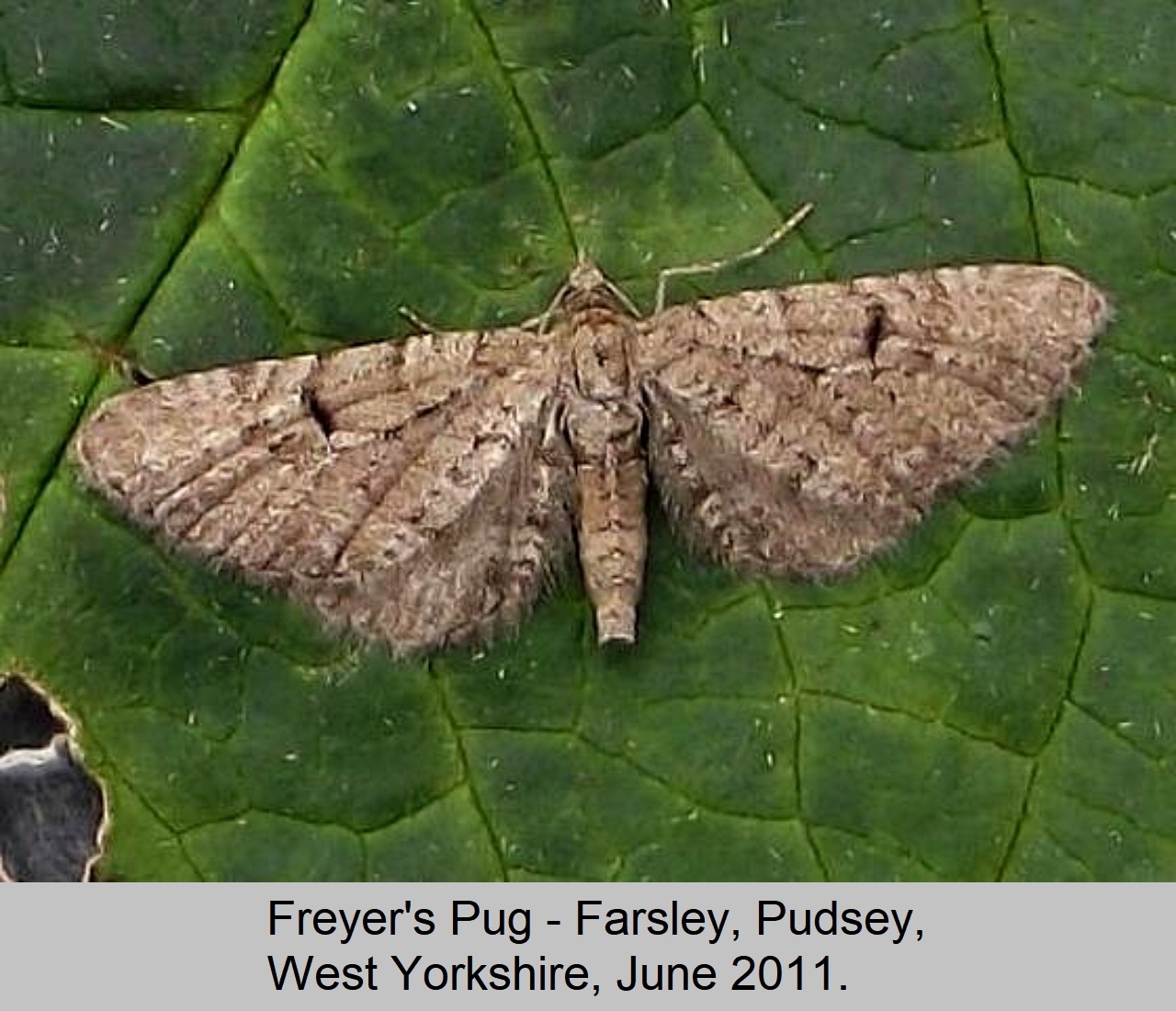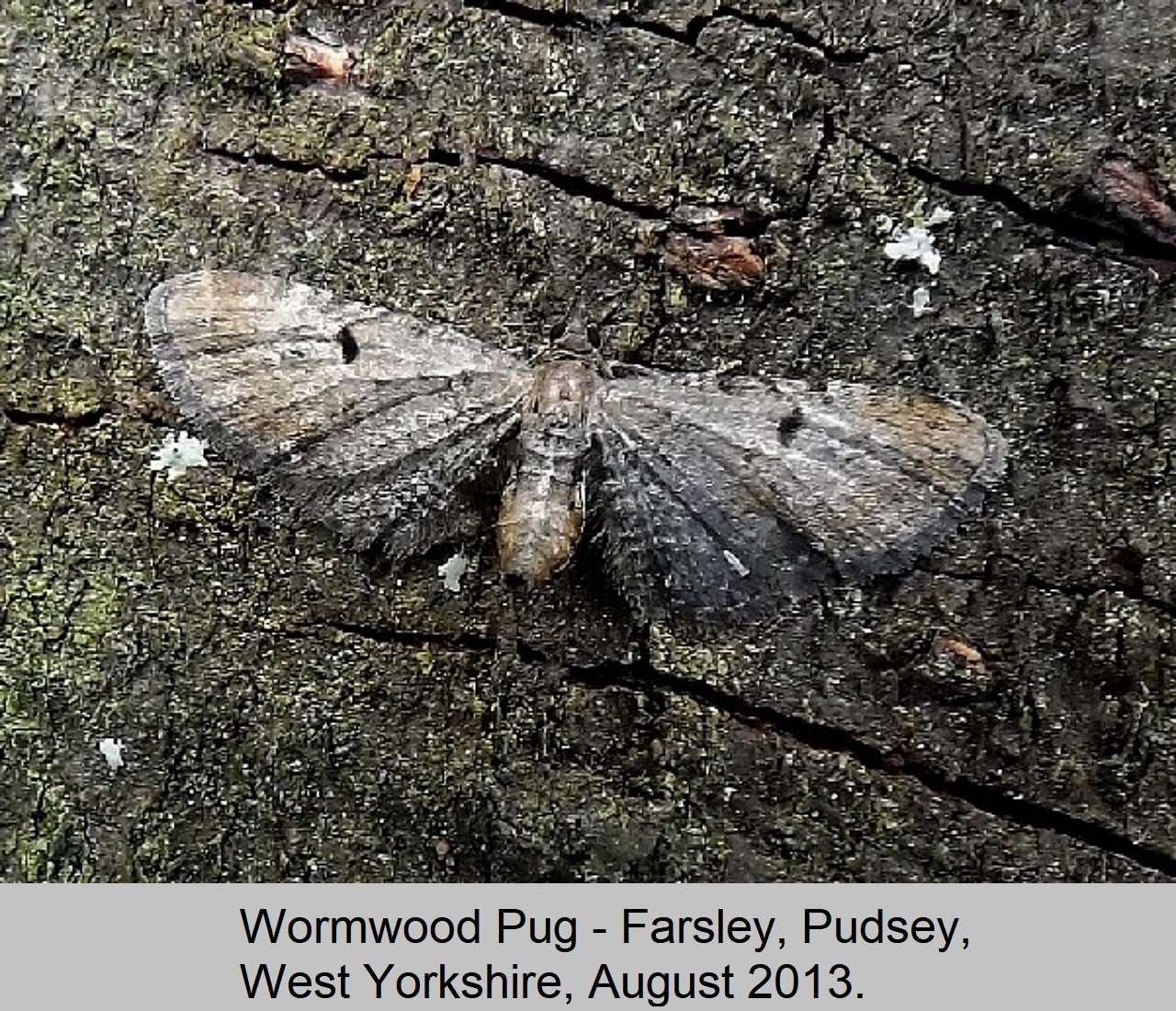|
|
||||||
|
|
|
|||||
| (Denis & Schiffermuller 1775) | (Denis & Schiffermuller 1775) | (Herrich & Schaffer 1852) | (Herrich & Schaffer 1852) | (Doubleday 1856) |
| Geometridae - Larentiinae | Geometridae - Larentiinae | Geometridae - Larentiinae | Geometridae - Larentiinae | Geometridae - Larentiinae |
| Juniper Pug | Juniper Pug | White-spotted Pug | White-spotted Pug | Currant Pug |
| Eupithecia pussilata pussilata | Eupithecia pussilata pussilata | Eupithecia tripunctaria | Eupithecia tripunctaria | Eupithecia assimilata |
| 70.158 BF 1854 | 70.158 BF 1854 | 70.160 BF 1835 | 70.160 BF 1835 | 70.182 BF 1832 |
 |
Status: Resident in UK. Wing Span: 17mm to 21mm. Flight Period: July into September. Habitat: This moth inhabits gardens, parks, hedgerows, down land, woodland fringes, and other places where their Juniper and Larch grow. Comment: Moths of this species are widely distributed throughout the UK. They are fairly common where their food plants grow. |
|
Status: Resident in UK. Wing Span: 17mm to 21mm. Flight Period: May to September in two broods. Habitat: Found in parks, gardens, hedgerows, roadside verges, woods., disused railways, heaths, commons, where ever the food plants grow. Comment: This moth is a wide spread, but locally common in England, Wales, Ireland and the south of Scotland. |
|
| (Freyer 1839) | (Freyer 1839) | (Freyer 1839) | (Prout 1914) | (Prout 1914) |
| Geometridae - Larentiinae | Geometridae - Larentiinae | Geometridae - Larentiinae | Geometridae - Larentiinae | Geometridae - Larentiinae |
| Freyer's Pug | Freyer's Pug | Freyer's Pug | Scarce Pug | Scarce Pug |
| Eupithecia arceuthata | Eupithecia arceuthata | Eupithecia arceuthata | Eupithecia extensaria | Eupithecia extensaria |
| 70.176 BF 1827 | 70.176 BF 1827 | 70.176 BF 1827 | 70.178 BF 1847 | 70.178 BF 1847 |
 |
 |
Status: Resident in UK. Wing Span: 20mm to 24mm. Flight Period: May and June. Habitat: Found in parks, gardens, and places where Cypress & Juniper grow. Comment: This moth is fairly common in south England, more local in Wales, and north England up as far as Yorkshire and Lancashire. Scarcer and more local Scotland, found on the Inner Hebrides. |
 |
Status: Resident in UK. Wing Span: 23mm to 25mm. Flight Period: June and July. Habitat: They inhabit salt marshes, the larvae feed on Sea Wormwood, and possibly some other plants. Comment: Moths of this species are only found in East Anglia, northwards to Humberside.. |
| (Hubner 1813) | (Hubner 1813) | (Hubner 1813) | (Hubner 1813) | (Doubleday 1856) |
| Geometridae - Larentiinae | Geometridae - Larentiinae | Geometridae - Larentiinae | Geometridae - Larentiinae | Geometridae - Larentiinae |
| Satyr Pug | Satyr Pug | Satyr Pug | Satyr Pug | Currant Pug |
| Eupithecia satyrata satyrata | Eupithecia satyrata satyrata | Eupithecia satyrata satyrata | Eupithecia satyrata satyrata | Eupithecia assimilata |
| 70.177 BF 1828 | 70.177 BF 1828 | 70.177 BF 1828 | 70.177 BF 1828 | 70.182 BF 1832 |
|
|
 |
 |
Status: Resident in UK. Wing Span: 21mm to 23mm. Flight Period: May and June. Habitat: This moth inhabits open wood land, fenland, waste ground, suburban gardens and road side verges. Comment: This moth is a fairly common, and is locally widespread throughout most of the UK. There are several different races that are localised and native to various parts of Britain. |
 |
| (Clerk 1759) | (Clerk 1759) | (Clerk 1759) | (Clerk 1759) | (Doubleday 1856) |
| Geometridae - Larentiinae | Geometridae - Larentiinae | Geometridae - Larentiinae | Geometridae - Larentiinae | Geometridae - Larentiinae |
| Wormwood Pug | Wormwood Pug | Wormwood Pug | Wormwood Pug | Currant Pug |
| Eupithecia absinthiata | Eupithecia absinthiata | Eupithecia absinthiata | Eupithecia absinthiata | Eupithecia assimilata |
| 70.179 BF 1830 | 70.179 BF 1830 | 70.179 BF 1830 | 70.179 BF 1830 | 70.182 BF 1832 |
|
|
 |
 |
Status: Resident in UK. Wing Span: 21mm to 23mm. Flight Period: June and July. Habitat: They inhabits wood land, waste ground, gardens and parks where ever its food plants grow. Comment: Moths of this species are resident, and fairly common throughout most of the British Isles. |
Status: Resident in UK. Wing Span: 17mm to 22mm. Flight Period: May and June. Habitat: Places that they inhabit include parks, gardens, allotments, plant nurseries and other places where its food plants, Wild Hop, Redcurrant and Blackcurrant, grow. Comment: Moths of this species are fairly common residents, and widely distributed throughout the British Isles. |
|
Species 70.183 to 70.198 |
|
on the next page |
||||||||
|
Contact Website Manager dave.hatton29@btinternet.com |
Web Designer Dave Hatton |
Dave Hatton reserves the copyright on all images. © 2022 |
||||||